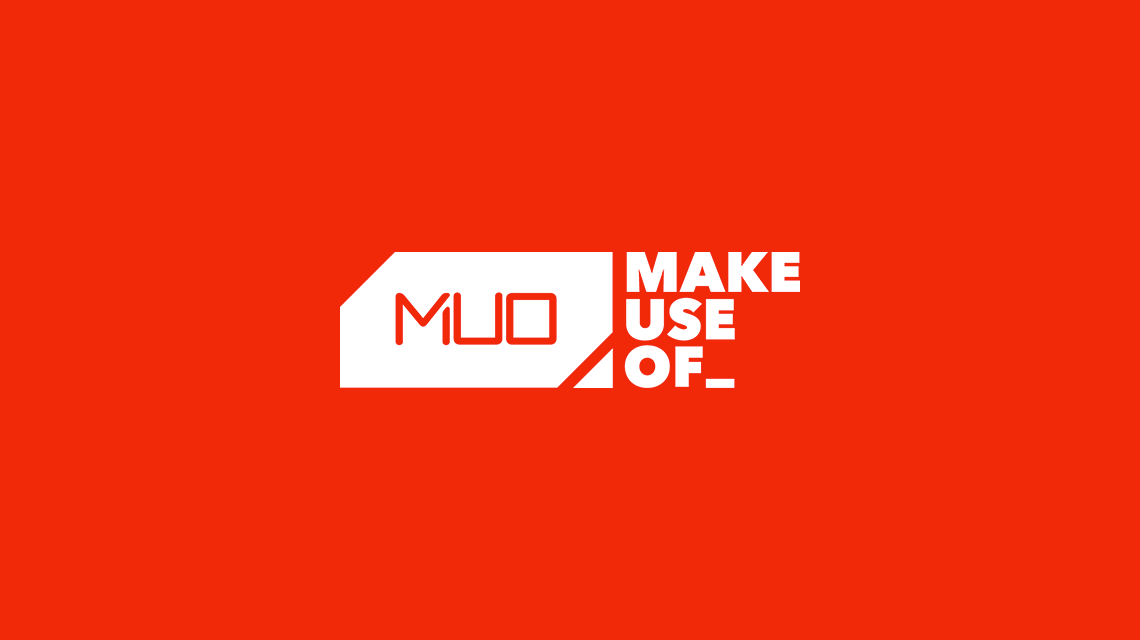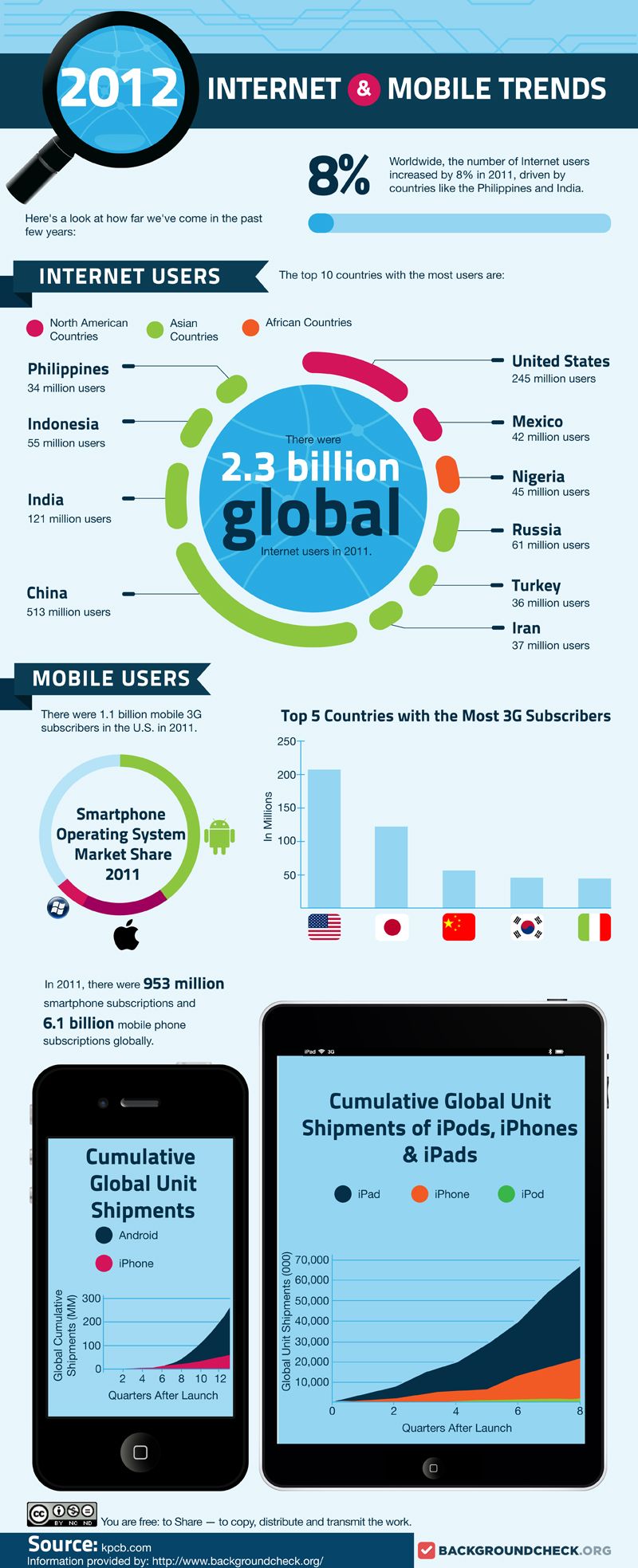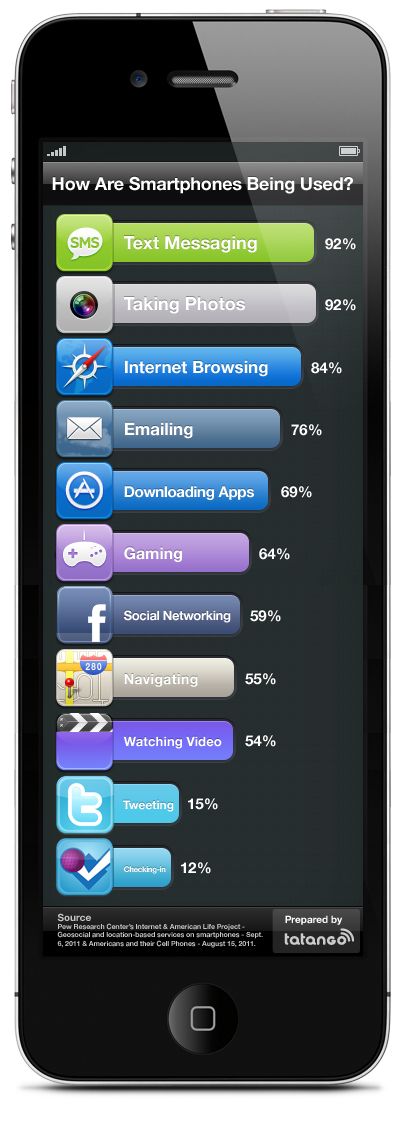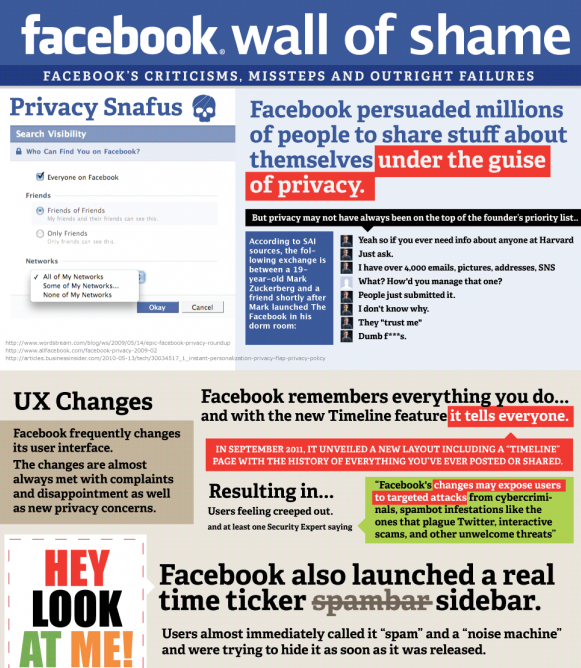Quick Links
In the good old days, we loved infographics posts (and so did our readers). But we've since learned it's better to post them on Pinterest. Here's a look back at what we found interesting in the early 2010s.
2012 Internet & Mobile Trends
As we come to the end of another year, it's time to look back and see how things have progressed up to now, and being a tech blog, we are naturally going to examine the tech scene during the past year or two. The following infographic breaks down and dissects the stats with regards to the way we consumed Internet content up to now. Did the regular PC win out or was it roundly defeated by other forms of communication? And where in the world does the Internet rule supreme?
Yup, as you may have already guessed (or known) by now, the PC is being trashed in favour of smartphones and tablets. But that isn't really a surprise (especially if you are a regular MakeUseOf reader and you've seen our coverage slanting a lot towards mobile and tablet applications). Everyone and their dog has a smartphone in their pocket and a tablet under their arm. And according to today's infographic, that smartphone is more likely to be an Android phone, rather than an iPhone or Windows phone.
And where does the Internet reign supreme? According to the infographic, China is soaring out ahead with an unassailable lead, with the USA and India in second and third place respectively (but our US readers can console themselves with the fact that they are beating China when it comes to 3G subscribers).
Let us know in the comments what you think of the infographic. Do the stats look accurate to you? Do you agree that the PC is slowly being relegated to history while smartphones and tablets are poised to take over the earth? Let us know what you're thinking.
Infographic Source: www.backgroundcheck.org
Image Credit: Man Looking At Internet Wordcloud via Shutterstock
Making The First Page Of Search Results
If there is one area of the Internet where the wars are vicious and cut-throat, it's the search engines. Ever since Google burst onto the scene, it's been a constant battle between them and Microsoft and Yahoo, each one constantly trying to outdo the other. In many ways, this is good for us, because these companies will constantly keep on innovating and bringing out cool new services and apps.
I am quite often taken aback at the amount of money that companies like Google spend in trying to stay the top dog. And you have to wonder who will be the next bloodied casualty, especially with persistent reports that Microsoft's Bing is losing a staggering $11 million a day.
Our infographic today comes courtesy of SearchEngineJournal.com which shows a timeline history of the search engines, starting with Lycos and Webcrawler in 1994. Then steadily over the years, we see household names springing up such as Yahoo, AltaVista, MSN and of course Google. The infographic also shows tips on how to make page one of search results.
Did you know that the person to call themselves an SEO expert was in 1999? These days, I get about 10 so-called SEO experts pitching me their services every day in my inbox.
Are you old enough to remember Lycos and Webcrawler? What would be your tips for making it to the front page of search results?
The Skype's The Limit
Remember back in the dark days before the Internet arrived, when you wanted to make an international phone call? First, you had to take out a bank loan to pay the extortionate charges that your phone company wanted to charge you. Then you dialed your number, and after getting cut off a few times, you finally manage to get through to the other caller. But they sounded so far away, as if they were underground, and the crackling on the line reminded you of an old gramophone record playing. And being able to see them on screen? Forget it. That was firmly in science-fiction futuristic land, in shows and movies like Star Trek and Star Wars.
But now, things have all changed, thanks to a company called Skype, and the rise of technology called VOIP (Voice Over Internet Protocol). This allows you to speak over the Internet for either free or for very low cost, and video calls are now as common as muck. They are being used in so many different ways. For example, a few years back, before I joined MakeUseOf, I was using Skype to give English lessons to foreign students all over the world. The teacher (me) was here in Germany but my students could be either in Italy, Austria or Thailand. Another frequent use of Skype is that the armed forces in Afghanistan and Iraq are using it to keep in touch with their families back home.
Our infographic today shows the rise of Skype and how it is being used today. Let us know in the comments if you have a unique use for it, and where you see the technology heading in the future.
Infographic Source: www.online-education.net
Image Source: CC Chapman
Twacked - When Good Twitter Accounts Go Bad
Without a shadow of a doubt, there are some really stupid people online but there are also many more evil people. Those that fall under the "stupid category" are those who have really obvious passwords such as "password" or "123456". Or their password recovery security question is something which can be easily answered with a simple Google search. But there are also many evil people online whose sole aim is to cause distress and havoc to peoples lives, and there's nothing more distressing than having an online account hacked into. I speak from bitter experience.
Our infographic today comes courtesy of Veracode.com and it's all about security on Twitter (or the lack of). You can see some of the 401 passwords that Twitter bans its members from using. It then moves on to some of the Twitter accounts that have been hacked such as Justin Bieber who got his revenge by finding out the hacker's phone number and tweeting it. The hacker then received 26,000 text messages. You can also see that the top ten Twitter accounts with the most followers have all been hacked at least once. The price of fame it seems.
What do you think of Bieber tweeting the hacker's phone number? Sweet revenge or losing the moral high ground? Have you ever "done a Wiener" and accidentally tweeted something embarrassing to your followers? Tell us all about it in the comments!
Image Credit : Creative Tools
Looking Up Your Internet Date Online
In the past PG (Pre-Google), people on dates could get away with outrageous fibs ("Yes, I really am a medical professor who will shortly be announcing a cure for cancer. Oh and did I tell you that I have four degrees, am a former US Navy pilot, I drive a Mercedes Benz and I have adopted 5 kids?"). But these days, with everyone's lives online on social networks, finding out if you really are the former President of the United States, as you claim you to be, is just a few clicks away from being either verified or exposed as a huge lie.
Our infographic today is on the subject of doing a background check on your Internet date-to-be. It runs down the most common lies that people say when you first communicate with them online. It also explains some of the possible reasons why people lie, such as a desire to sound better than they actually are.
The infographic also provides you with some helpful hints on how to spot a liar, and some online sources to find out more information on someone. Even using something as simple as using Facebook and Google will throw up stuff like personal websites, political opinions, religious beliefs, and blog/forum comments. Other websites can even show you if they are a wanted fugitive or a sex offender.
In this day and age, anyone can be a private investigator! (cue Magnum P.I. music).
http://www.youtube.com/watch?v=3CquMO3vJvo
Doing a background check on a date may take some of the romance out of things. But if you have only "met" the person online up to this point, then you really do need to take some precautions. The person you are dating could be a serial killer, a child sex offender or a scam artist.
Do you do background checks on your dates? If so, what interesting information have you managed to dig up on someone? Any dirty little secrets? Give us all the gossip in the comments below.
Infographic Source: www.backgroundcheck.org
How to Completely Digitize Your Finances
I can't remember the last time I actually went into my bank in person. Simply because there is no longer any need to. My salary is electronically transferred to my account, my bills are paid via online banking and automatic transfers, my account statements are available online as PDF files.....
Gone are the days of paper checks, going to the bank to deposit my salary, and getting paper statements in the mail. Gone are the days of chatting up the pretty girl behind the bank counter. Now I have a relationship with my Internet browser, as I log on and start crying as I view my rather low bank balance.
Our infographic today is all about digitizing your finances in the age of the Internet. If you haven't already, you should be registering for online banking and installing your bank's app on your mobile phone. You should also be stopping all paper statements and having them sent to you electronically. This will actually save you money. When I stopped my paper statements, my monthly bank fees dropped considerably.
Let us know in the comments how much you have embraced the concept of online banking. Do you do all your financial wizardry online or are you of the Old School that distrusts all technology when it comes to your money? Let us know below.
Infographic Source: www.mobiloans.com
Image Source: freya.gefn
Scoring Klout
Ever since it was first introduced in 2009, Klout has seen its fair share of fans and critics. Fans, such as bloggers, use Klout to highlight their "online influence" in order to snag freebies, and businesses, such as hotels and restaurants, use Klout to identify socially influential customers whom they can give upgrades to, in exchange for some nice press. On the other hand, the critics have bashed Klout relentlessly, with one calling it "the Internet equivalent of herpes" and job seekers have reportedly been denied jobs because their Klout score was too low.
So what is this Klout thing anyhow? Well Dave recently did a full write-up on it but if you're in a hurry and want the short version, Klout is a way of measuring a person's influence online. It pulls together the social activity from a person's Twitter page, Facebook account, Google Plus page and much more. Then it comes up with a number and that number is your "Klout", your level of online influence. The higher the better. Mine is 54 (which could get me tickets to a Bon Jovi concert!) and goes one or two points either way, every 2-3 weeks. To give you some comparison points, Barack Obama is a whopping 94, Pepsi is a miserable 10 and Harry Potter is 58 (I'm being beaten by a fictional character - that's REALLY embarrassing!). Oh and MakeUseOf, your favourite tech blog is 65.
So now it's time for you to tell us in the comments what you think. Is Klout a total waste of time and another stupid useless gimmick on the Internet? Or do you think there are practical uses for knowing who the movers and shakers of the Internet are? Do you have any ideas how Klout might be improved? It's time to vent!
Infographic Source: www.onlinedegrees.com
How Are Smartphones Being Used?
Mobile phones have come a long way over the years. From heavy bricks with huge aerials, mobile phones (sorry, cellphones for our US readers!) are now small, light, sleek and carries an operating system that enables you to install apps and access the Internet. Named smartphones, the two main contenders in this space are the iPhone and Android, both of whom continually introduce new features in order to stay one step ahead of the other.
But how are smartphones really used? What are the most used features? Our infographic this week comes from Tatango which shows that text messaging is the number one use of a smartphone followed by taking photos and then Internet browsing. But what I want to know is where is actual telephone calling on this list? Is it too radical these days to think of a phone as a tool to make phone calls?
Tell us in the comments what your top three uses of your smartphone are. Does the list below look accurate to you?
A Day On The Internet
I absolutely love my job as managing editor of MakeUseOf.com but many people, family included, look upon what I do with a lot of bemusement, a kind of "is he STILL deluded into thinking that's a JOB? When is he going to act responsibly and get a REAL job?". But the infographic below is a classic example of why I love my job and why the Internet is the best place to be working - because it's where everything is happening baby!
The first stat alone says it all - all the online information we consume on a daily basis can fill up 168 million DVD's (suddenly all those crappy AOL disks that kept on appearing a decade ago don't seem so bad!). We send out hundreds of billions of emails, write millions of blog posts and much more. Suddenly working in Burger King, flipping burgers and cleaning toilets doesn't seem to be all that appealing, does it? Come home, go online, start your own blog and update your Facebook status instead.
What do you do on a daily basis on the Internet? Do you live in Facebook? Or are you camped out more in your email inbox? Or maybe you're a budding blogger? Give us a breakdown of your Internet day.
Infographic Source: www.MBAonline.com
Image Source: Wheresmysocks
The Olympic Evolution Of Mobile
4 years is the equivalent of an entire generation when it comes to electronics and mobile phones and the Internet. What exists today in our popular culture may either have not existed or may have just been getting started up 4 years earlier. Which is why, as we celebrate and enjoy the beginning of the 2012 London Olympic Games, it's worth taking a look back at where technology and the Internet was in previous Olympics.
Back in Atlanta in 1996, the Internet and mobile phones were just getting started. Back then, options were seriously limited. There was no Twitter or Facebook, and smartphones didn't exist. As we progressed through Sydney, Athens and Beijing, mobile phones got better, text messaging and social media got off the ground and with the introduction of the iPhone, smartphone apps. Now with the 2012 Olympics, we're tweeting every moment, Facebooking every triumph and texting our friends when our country wins a gold medal.
Our infographic today breaks down the stats for you on this very subject. Let us know in the comments how you will be making use of technology and social media in the 2012 Olympics.
Infographic Source: floatlearning.com
Image Source: Olympic Torch by Peter J Dean
Who Uses The Internet Best?
Sweden - the land of pretty blonde ladies, IKEA, saunas, cold weather....OK, before you all storm the comments section crying foul (including our very own Tina, who has lived in Sweden recently), I admit that I have just stereotyped a nation that is probably very lovely, and very nice to be around. And what makes them an even better nation (in my eyes anyway) is that Sweden has been declared the country that uses the Internet the best. Yay Sweden!
What does that mean? Well, as today's infographic from OEDb.org shows, 61 countries were assessed Internet-wise, across 7 categories, which included communications infrastructure, web use, web content, and institutional infrastructure. And Sweden came out on top. Take that Norway and Finland! When it comes to Scandinavian Internet, Sweden are the top dogs! This is probably helped by the fact that 90% of all Swedes are online (compared to 75% of Americans).
Take a look at the infographic and then let us know in the comments what your thoughts are (apart from my stereotypes). Are you surprised that Sweden came out on top? What is it about your country that makes it a good place to be, Internet-wise?
Infographic Source: www.oedb.org
Image Source: Man With Open Mouth & Swedish tongue via Shutterstock.com
Can Bing Knock Out The Champ?
If you ever decide to play a little game of word association, and someone says "search on the Internet", the chances are you will immediately reply "Google". "To Google" has become the everyday verb for searching online, due to the site's near-total dominance in the search industry. But I say "near-total" because one search engine, despite operating at a loss, is making themselves a continual irritant, and an obstacle to Google's aim of total Internet domination. That search engine is of course Microsoft's Bing.
The constant attempts to one-up each other means that they are constantly innovating, and that is good for the end user (that's you by the way). But with all the changes that occur on both sites, which search engine is actually the best? Is Bing really the hopeless underdog or do they have a huge trump card that could upset the proverbial apple cart? That's the subject of today's infographic, which looks at each site's search features.
After examining the infographic, what do you think? Is Google the undisputed untouchable heavyweight champion of cyberspace? Or is Bing the Internet equivalent of Rocky Balboa, ready to come into the ring and snatch the title away? What search feature is the one that could decide it all? All opinions and further boxing analogies in the comments below.
Infographic source: www.onlinedegrees.com
Image Source: Imjustcreative
More Americans Are On Facebook Than Have A Passport
Google Plus may have arrived on the social networking scene, smashing in like a bull in a china shop, but it's still going to take some doing for the search engine giant to dislodge the Big Boy On The Block, Facebook.
Everyone who's everyone online has a Facebook account, and this may partly account for the fact that there are now more US Facebook account holders than US passport holders. Does this mean that Americans prefer a trip to cyberspace instead of a trip to somewhere in the real world? Interpret it how you will.
The infographic below was made by the travel website Tripl and gives a clear and concise breakdown of the important facts and figures. As usual, just click on the infographic below to be taken to a bigger and clearer version. We had to shrink it to make it fit on our page so this version isn't entirely optimal.
As usual, we would love to hear your opinions about this infographic in the comments.
Facebook's Wall Of Shame?
I've seen some rather rough criticism of Facebook over the years as they have lurched from one fiasco to another but this infographic, which I found on my cyberspace travels today, kind of sums it all up in a rather dry sarcastic sort of way. By the time you're finished, you'll probably be seriously considering finally deleting that Facebook account and going over to Google Plus once and for all!
No person or company is perfect. Everyone makes mistakes - that's life and we need to learn from those mistakes so we don't repeat them. But Facebook seems to be at the top of the "constantly making errors that annoy their users" list and the number one constantly repeating error for Facebook is ALWAYS privacy-related.
Whether it's revealing a user's information without their consent, using that information for commercial gain without your consent, or people seeing information of yours that they're not supposed to see, there's always something going on in Facebookland. And we have written LOTS of Facebook privacy related articles in the past.
Just use our search engine to find them all.
Let us know in the comments what you think of the infographic. Is the criticism fair? Anything that was missed out? And do you miss any of the discontinued products mentioned? Let us know in the comments.
The infographic is too big to be displayed here, you may check it out in full size by clicking on the image below.
Image Credit : rishibando
Are YOU a Facebook Power User?
I was under the impression that I was a pretty enthusiastic user of Facebook [Broken URL Removed], but it seems that I am minor small beans compared to some people, who have been labelled "Facebook Power Users" (sounds like a superhero team, fighting the bad guys by "poking" them). Are you one of these Power Users who seemingly make up 20-30% of Facebook? Check out today's infographic and see how much of it applies to you.
The Power Users are apparently the ones that fuel the engines that make up the Zuckerberg Empire. They send their friend requests, hit the like button, post their status updates, pretty much what the rest of us do. But they also seemingly go the extra distance and spend a big chunk of their life on the social network, tagging, poking, LOL'ing, commenting, ROFL'ing and WTF'ing. They also get political, attending rallies, and using the site to get their Facebook friends to vote for particular candidates. I don't know about you but a Facebook friend like that would make me tired!
Check out the infographic and tell us in the comments below how much of it applies to you. Are YOU one of the mythical power users who holds so much sway over Mark's Facebook shares? If so, how on earth do you find the time?
Image Credit : Mayu Shimizu
Google Versus Facebook On Privacy & Security
It's the classic ongoing battle which has been raging relentlessly without a ceasefire since the birth of social networking - how much privacy and security (if any) do you actually have on these sites? And who wins in these areas (if anyone)? The two top dogs currently slugging it out for the number one spot are Google and Facebook. Each both have things going for them and things going against them.
For example, Google kicks the pants off Facebook when it comes to working capital and monthly unique users. But the search engine giant falls down completely in the areas of banning the use of pseudonyms and blocking individuals from seeing a post. Both sites are also the subject of a huge number of cyberattacks, which will put your data at risk when someone finally succeeds at breaking through. So who has the best firewalls and site security?
It's difficult to tell for sure who trumps who in the privacy and security battles, which is why this handy infographic from Veracode.com sums things up nicely for you to make your own mind up. Let us know what you think. Who would you trust more with your private information? Google or Facebook? Or neither? Do you think either network is improving in these areas or getting worse?
Click on the infographic to be taken to a larger version
HR Must Embrace Social
Like it or not, Facebook is becoming a huge part of online users lives, but not if offline companies have anything to do with it. It seems that, at every turn, companies are doing their level best to block access to Facebook and other social media sites to employees at work, even though there are compelling reasons why they should do the exact opposite.
This is the subject of today's infographic, which examines how companies seem to be obsessed with finding out what their employees are saying on their private Facebook accounts, while at the same time doing everything they can to stop those same employees from accessing social media while at work. I'm lucky in that I am self-employed so I can go on Facebook anytime I want, so I can't claim to know what it is like to be barred from the Internet while at work. But in this day and age, where companies live and die by social media, it is madness that companies don't allow their employees to go online and promote the company on the one site that everyone is browsing at one time or another.
What about the company where you work? Does it embrace social media and let you and your colleagues onto Facebook? Or is Facebook strictly forbidden? What do you think are the upsides and downsides of allowing people onto social media in company time? Does one outweigh the other? Let us know in the comments.
Infographic Source: www.complianceandsafety.com [Broken URL Removed]
Image Source: Businessman Holding Like Board via Shutterstock
Threat Level Mobile
Lots of people, including myself, love their smartphone. Mine is virtually an extension of my arm and goes with me everywhere. But that innocent looking phone in your hand is also a weapon if handled by the wrong person. Which is why it is essential that you put a PIN lock on the phone, to prevent any unnecessary access, and limit what information apps have access to, about yourself.
The infographic today shows the various "threats, vulnerabilities and risks with mobile devices in enterprise". It seems that it is a good job being a New York City cab driver as 200 smartphones are lost in NYC cabs every day. And 95% of people who found a smartphone "tried to access it". Whether this means they just tried to find the owner's details or if they tried to snoop around in a devious manner, is unclear. But again, this proves that a PIN lock is invaluable. And here was everyone laughing at me for my paranoid behaviour, having multiple PIN's for everything....
Let us know in the comments below what you think of the infographic. Would you ever try to access a phone you had just found? Have you ever had malware installed on your phone? Let us know in the comments below.
Infographic Source: Fixmo [Broken URL Removed]
Image Source: Mr T in DC















